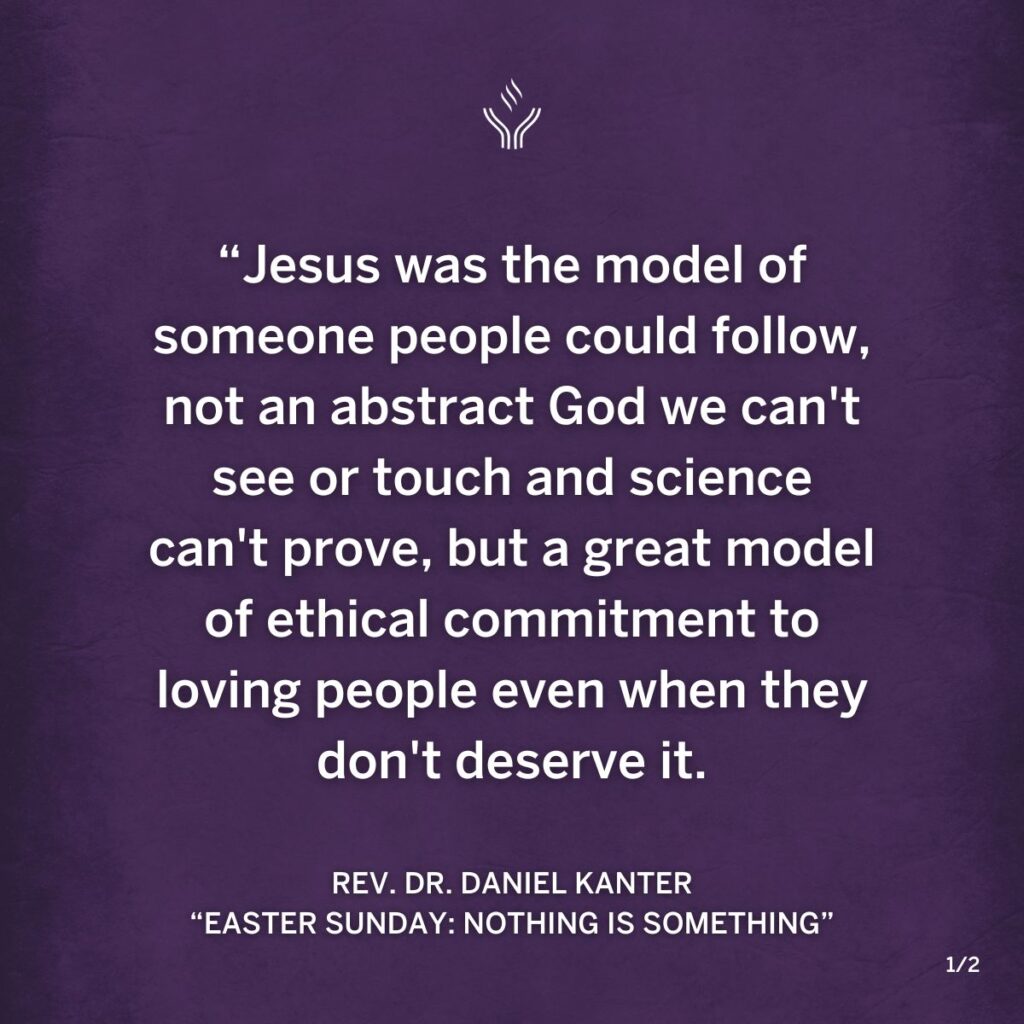Easter Sunday: Nothing is Something | Rev. Dr. Daniel Kanter | 03.31.24



God is No-Thing
Well, the comedian Pete Holmes, once a seminarian and now a quite successful comic, in the middle of one of his shows broke out into a theological dispute (click here to view the video.) He said, “Some people think God created the universe. Some people think nothing created the universe, which is the funniest guess. And the nothing people make fun of the God people. They say, ‘God doesn’t exist.'” He said, “I’m okay maybe with that, but you know what definitely doesn’t exist? Nothing. That’s the defining characteristic of nothing, that it doesn’t exist. So what are we talking about?” He says, “Either you think it’s God, something you can’t see, touch, taste, photograph or science can’t prove or you think it’s nothing, something you can’t see, touch, taste, photograph and science can’t prove. But I think,” he said, “we can all agree if nothing, if your nothing sometimes spontaneously erupts into everything, that’s pretty God damn magical, nothing, you guys.”
And he says, “Ask the nothing people what happens when you die and they’ll tell you nothing, you go into nothing.” And I’m like, “You mean you merge back with your creator? That’s heaven.” He goes on to say that nothing actually makes much sense, that you’re on a planet, you think you’re in America, but zoom out, he says, “You’re on a space rock floating in nothingness, infinite nothingness, and the infinite nothingness is expanding, which means that endlessness is getting bigger and that makes no sense.” He says, “Everything is molecules also and that doesn’t make sense, but these molecules, they know who they are, Daniel, T. J. and Beth, and that doesn’t make much sense.”
And Pete Holmes got me thinking about all this eternal soup we’re in and all these molecules floating around and calling themselves names and calling other people names and all the molecular history we write down in books and fill libraries with.
What is a Christian anyway?
And I started thinking, you know what also doesn’t make sense? I’ll give you a hint. It starts with E and it ends with R. And it’s not eavesdropper, escalator, eye-popper or eco-friendlier. It’s the reason you all dressed up and came to church today, the one and only day that you come to church, which for Unitarians really makes no sense because you came to a church one time in the year that doesn’t believe Jesus was God, resurrected by a God that we don’t sharply define and looks more like nothingness on Easter, and that doesn’t make sense. Or does it?
Now, I’ve been around the Unitarian church since I was squeaking in my diaper in my mother’s arms and I have witnessed some ambivalence about Jesus and for sure some antagonism to Christianity, although I must say in the last 10 years, you all are doing a lot better on this topic. Years ago, the idea that someone could be Christian and Unitarian seemed a mystery to some. Now we’ve been through some conceptual mind-bending times and somehow our churches, although came from Christianity, back in the day, weren’t Christian at all. The ministers couldn’t have their own theological leanings and Unitarian Christianity, it must be some reactionary movement. We went through those times, times when my colleagues would say, “People will listen to dry intellectual quotes from eastern gurus and chic revolutionaries, but Christianity, now that’s a little too personal and threatening.”
Tolerance and inclusivity aside, which leads us to the question of what is a Christian anyway? Which is a good question for a Unitarian celebrating Easter.
“Who is Jesus?” Asked the disciples. “Who was He and what did He say?” Asked the early church. These questions have consumed millions of hours of people’s time from Paul till today. Institutions were built to answer these questions. Liturgies and careers and movements and hierarchies and revolutions and even some Bible salesman, you name it, all came from these questions, all because this man and his movement. Now, a lot of people today in a lot of churches are going to try to define who Jesus was.
Recent research I read said 80% of Americans believe that Jesus is the son of God, the Father. That means 10% disagree and 10% aren’t so sure, you figure out who you are in that equation. 41% said God’s son existed before Jesus was born and the rest of them are just confused about that question, and 9% believe that the Bible says Jesus came to bring division rather than peace.
And the debate goes on. And we have a similar question, not who was He but what is a Christian? Well, good question. And I would say a Christian is someone who pays attention or tries to act a little like a bunch of molecules who walked around Galilee 2000 years ago calling himself Jesus, who wasn’t a priest, wasn’t a rabbi or a minister, He was a poor, homeless wayfarer who had something to teach humanity. But if we’re honest, what he taught wasn’t all that creative, actually. Love your God and your neighbor, those were common Jewish theological teachings at the time and like today, it was rarely practiced by those who taught it and that is the rub. It was terribly creative to teach people to love, but it was another thing to live by that teaching. This is why Jesus isn’t nothing. Whether He intended to or not, He built a movement with some really motivated disciples who didn’t start any churches or synagogues, left no writings or plans and left a really scant trail of real sayings.
Jesus as a great model of ethical commitment
The only one the scholars agree is, if someone slaps you, you turn the other cheek, which if we’re honest is only good advice if the person is your mother or someone who outweighs you by a couple hundred pounds. But what that’s saying is, the one that the scholars say there really is the only thing that Jesus might’ve said is more than anything, a call for peace, and that’s something for humans to ponder. What Jesus was was the beginning of a model of someone people could follow, not an abstract God we can’t see touch, taste, photograph and science can’t prove or you think is nothing, but a great model of ethical commitment to loving people even when they don’t deserve it. A model that represents the struggle between the flesh and the spirit, a model who led a rebellion against conformity and the acceptance of the way things are, and a model for how to live naming what is true while struggling with the battle between life and death.
Jesus or the story of Jesus has all of what we molecular messes go through in life, suffering and love, moments of clarity, moments of confusion, confronting power and giving in to power, loneliness and being misunderstood, the death of our dreams and new life to those same dreams and communion and friendship and joy even in the face of empire and violence and the abuse of power. Even as some today will interpret Jesus’ death as victory for all, to me, the miracle of today is that all this lasted 2000 years. All these words, all these stories, what really matters is that they help me define who I am with words like, “By your good works, you glorify God. Faith without works is dead. And for I was hungry and you gave me something to eat and I was thirsty and you gave me something to drink and I was a stranger and you invited me in and I needed clothes and you clothed me and I was sick, and you look after me and I was in prison and you came to visit me.” Have you ever heard those words?
They’re pretty good ideas to live by. They’re something, not nothing. And they became the model of what would become the beginning of the church, despite how far the church has strayed from that core mission to serve and to be of use and to define our molecular lives by what we do in the world, not by what we say. That ground floor of the church at large has been warped into so many things we aren’t going to talk about today, but I’m pretty sure the churches who promise, if you believe in Jesus, you will somehow be blessed by Jesus with riches or those who promote some political reality that discriminates against people for non-conformity, have it wrong and have not the blessing of the real God of nothing. I’m pretty sure that if we read the stories closely that we have it nearer to right, which makes our Easter service the place to be. Thank you very much.
Because here, and maybe why you showed up today, here we try to encourage living your life closer to the Jesus who said those things about feeding and serving and seeing no stranger and turning acts of love into action. Plus that line in the Maundy Thursday service that is the mandate to all life, that if the God of nothing or nothing of God wants human beings to do anything, it’s to love one another, to live in mutuality. That is God to me. When we feel a bond between you and me and everyone, and even those we disagree with, all the molecules in life as one, we learn that lesson again and again, the one that the Jesus of Nazareth was teaching in his rambling stories, telling and taking in of strangers and challenging truths. And if we live through those things, we might be better off as people and a world.
Living into our mutuality
Or as Aurora Levins Morales, a Jewish Puerto Rican poet who T. J. read today who grew up at first Unitarian church in Chicago says, “What if? What if we never drown in despair but learn to float? What if here and now in the death throes of the age of greed in fevered ramping up of extraction with our people falling all around us, we crouch around the fire we keep making in a bed of shredded headlines from the fictions of our hopes rubbed like prayer beads between our palms until they spark and tell each other these stories, nothing is lost.” She says, “The rivers are ancient, but the moment is new.” What if we live into our mutuality like Jesus wanted us to? What if the miracle we celebrate today isn’t Jesus being taken up to heaven by God, but that out of nothing, we came? In the beginning was the word and the word became molecules called Jesus who used words to try to reset the human heart. And it all became us, sitting in this space with our nice clothes and wondering what this is all about and hearing words and stories and hopes rubbed together, stories about nothing and everything. And that’s what matters.
What if? And what if it matters that once a year we Unitarians and people all over the world put on bright-colored clothes and hats and just show up? And what if because of all this, maybe today we’re just a little more kind to one another and we see life as precious, not despairing and it reboots the hearts of each of us? What if resurrection isn’t Jesus getting pulled up to heaven, but rather we getting pulled up into caring about what matters? Giving up on our cynicism and our fear about the world just for a moment and making sense of a story that doesn’t really make a lot of sense. It’s seeing in it an urging for mutuality and a signal to the possibility of the crushing call to love. Such possibilities come from nothing through God to us, via Jesus, and I don’t know if any of this makes sense, but what makes sense to me is that it’s Easter and Easter asks us to have faith in something, to give history a higher meaning, to affirm the freedom of the human spirit, to cultivate some humility and love and compassion and see how these things illuminate life’s purpose.
And that makes sense to me. That is why I love Easter, and that is maybe why you came here today, and I hope you come back next week. And that is why those, “He has risen,” signs don’t bother me because what rises in me each time on this Sunday is a great hope for us all, is a reminder, a call to love, a joy, a community of souls seeking something, a group of molecules that just call themselves names who showed up here, and that’s what matters. So friends, happy Easter and amen.







